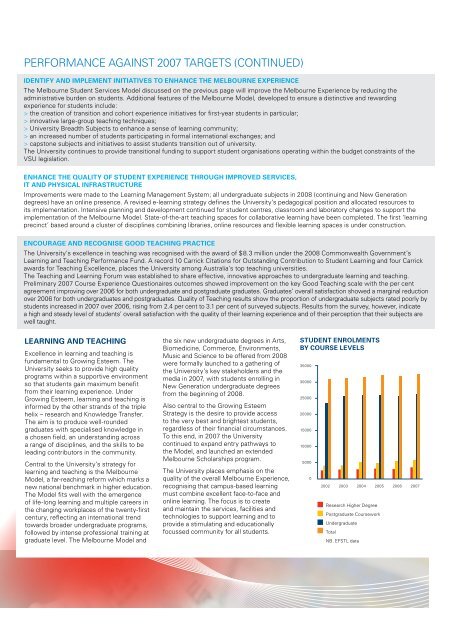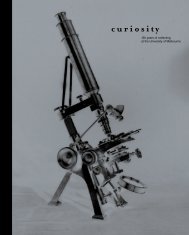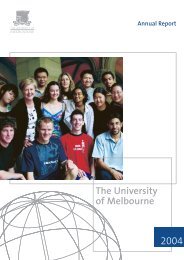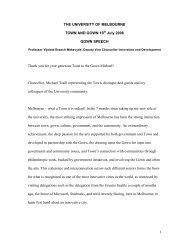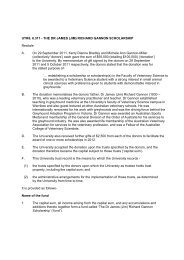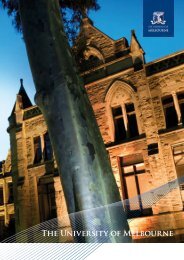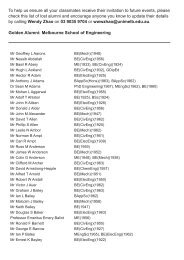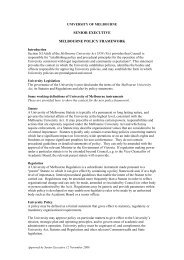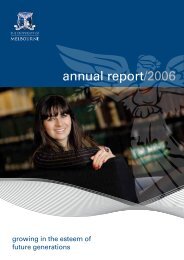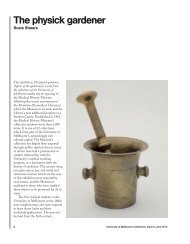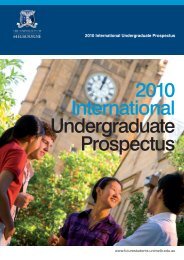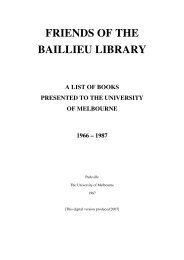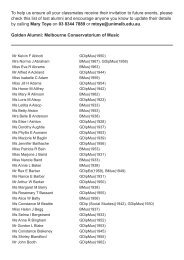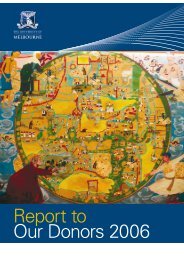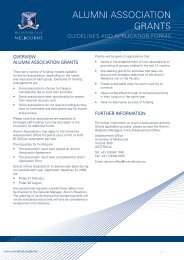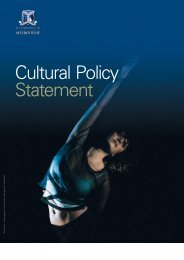2007 Annual report (PDF 8.1 Mb) - University of Melbourne
2007 Annual report (PDF 8.1 Mb) - University of Melbourne
2007 Annual report (PDF 8.1 Mb) - University of Melbourne
Create successful ePaper yourself
Turn your PDF publications into a flip-book with our unique Google optimized e-Paper software.
Performance Against <strong>2007</strong> Targets (continued)<br />
Identify and implement initiatives to enhance the <strong>Melbourne</strong> Experience<br />
The <strong>Melbourne</strong> Student Services Model discussed on the previous page will improve the <strong>Melbourne</strong> Experience by reducing the<br />
administrative burden on students. Additional features <strong>of</strong> the <strong>Melbourne</strong> Model, developed to ensure a distinctive and rewarding<br />
experience for students include:<br />
> the creation <strong>of</strong> transition and cohort experience initiatives for first-year students in particular;<br />
> innovative large-group teaching techniques;<br />
> <strong>University</strong> Breadth Subjects to enhance a sense <strong>of</strong> learning community;<br />
> an increased number <strong>of</strong> students participating in formal international exchanges; and<br />
> capstone subjects and initiatives to assist students transition out <strong>of</strong> university.<br />
The <strong>University</strong> continues to provide transitional funding to support student organisations operating within the budget constraints <strong>of</strong> the<br />
VSU legislation.<br />
Enhance the quality <strong>of</strong> student experience through improved services,<br />
it and physical infrastructure<br />
Improvements were made to the Learning Management System; all undergraduate subjects in 2008 (continuing and New Generation<br />
degrees) have an online presence. A revised e-learning strategy defines the <strong>University</strong>’s pedagogical position and allocated resources to<br />
its implementation. Intensive planning and development continued for student centres, classroom and laboratory changes to support the<br />
implementation <strong>of</strong> the <strong>Melbourne</strong> Model. State-<strong>of</strong>-the-art teaching spaces for collaborative learning have been completed. The first ‘learning<br />
precinct’ based around a cluster <strong>of</strong> disciplines combining libraries, online resources and flexible learning spaces is under construction.<br />
Encourage and recognise good teaching practice<br />
The <strong>University</strong>’s excellence in teaching was recognised with the award <strong>of</strong> $8.3 million under the 2008 Commonwealth Government’s<br />
Learning and Teaching Performance Fund. A record 10 Carrick Citations for Outstanding Contribution to Student Learning and four Carrick<br />
awards for Teaching Excellence, places the <strong>University</strong> among Australia’s top teaching universities.<br />
The Teaching and Learning Forum was established to share effective, innovative approaches to undergraduate learning and teaching.<br />
Preliminary <strong>2007</strong> Course Experience Questionaires outcomes showed improvement on the key Good Teaching scale with the per cent<br />
agreement improving over 2006 for both undergraduate and postgraduate graduates. Graduates’ overall satisfaction showed a marginal reduction<br />
over 2006 for both undergraduates and postgraduates. Quality <strong>of</strong> Teaching results show the proportion <strong>of</strong> undergraduate subjects rated poorly by<br />
students increased in <strong>2007</strong> over 2006, rising from 2.4 per cent to 3.1 per cent <strong>of</strong> surveyed subjects. Results from the survey, however, indicate<br />
a high and steady level <strong>of</strong> students’ overall satisfaction with the quality <strong>of</strong> their learning experience and <strong>of</strong> their perception that their subjects are<br />
well taught.<br />
Learning and Teaching<br />
Excellence in learning and teaching is<br />
fundamental to Growing Esteem. The<br />
<strong>University</strong> seeks to provide high quality<br />
programs within a supportive environment<br />
so that students gain maximum benefit<br />
from their learning experience. Under<br />
Growing Esteem, learning and teaching is<br />
informed by the other strands <strong>of</strong> the triple<br />
helix – research and Knowledge Transfer.<br />
The aim is to produce well-rounded<br />
graduates with specialised knowledge in<br />
a chosen field, an understanding across<br />
a range <strong>of</strong> disciplines, and the skills to be<br />
leading contributors in the community.<br />
Central to the <strong>University</strong>’s strategy for<br />
learning and teaching is the <strong>Melbourne</strong><br />
Model, a far-reaching reform which marks a<br />
new national benchmark in higher education.<br />
The Model fits well with the emergence<br />
<strong>of</strong> life-long learning and multiple careers in<br />
the changing workplaces <strong>of</strong> the twenty-first<br />
century, reflecting an international trend<br />
towards broader undergraduate programs,<br />
followed by intense pr<strong>of</strong>essional training at<br />
graduate level. The <strong>Melbourne</strong> Model and<br />
the six new undergraduate degrees in Arts,<br />
Biomedicine, Commerce, Environments,<br />
Music and Science to be <strong>of</strong>fered from 2008<br />
were formally launched to a gathering <strong>of</strong><br />
the <strong>University</strong>’s key stakeholders and the<br />
media in <strong>2007</strong>, with students enrolling in<br />
New Generation undergraduate degrees<br />
from the beginning <strong>of</strong> 2008.<br />
Also central to the Growing Esteem<br />
Strategy is the desire to provide access<br />
to the very best and brightest students,<br />
regardless <strong>of</strong> their financial circumstances.<br />
To this end, in <strong>2007</strong> the <strong>University</strong><br />
continued to expand entry pathways to<br />
the Model, and launched an extended<br />
<strong>Melbourne</strong> Scholarships program.<br />
The <strong>University</strong> places emphasis on the<br />
quality <strong>of</strong> the overall <strong>Melbourne</strong> Experience,<br />
recognising that campus-based learning<br />
must combine excellent face-to-face and<br />
online learning. The focus is to create<br />
and maintain the services, facilities and<br />
technologies to support learning and to<br />
provide a stimulating and educationally<br />
focussed community for all students.<br />
student enrolments<br />
by course levels<br />
35000<br />
30000<br />
25000<br />
20000<br />
15000<br />
10000<br />
5000<br />
0<br />
2002 2003 2004 2005 2006 <strong>2007</strong><br />
Research Higher Degree<br />
Postgraduate Coursework<br />
Undergraduate<br />
Total<br />
NB. EFSTL data


